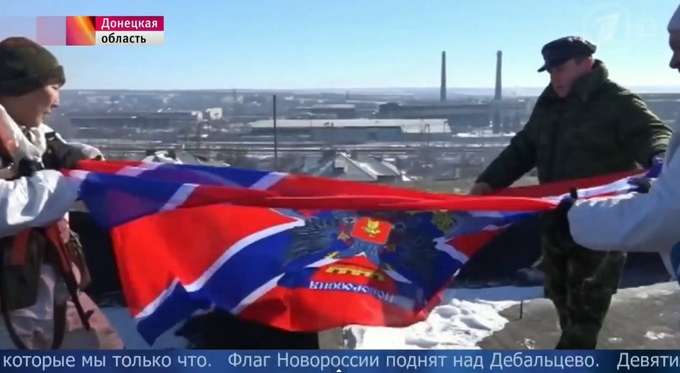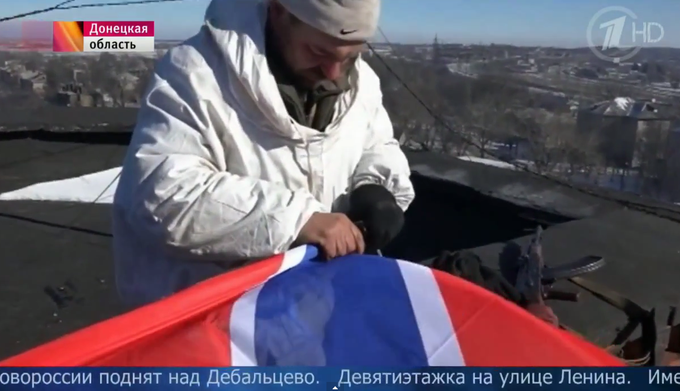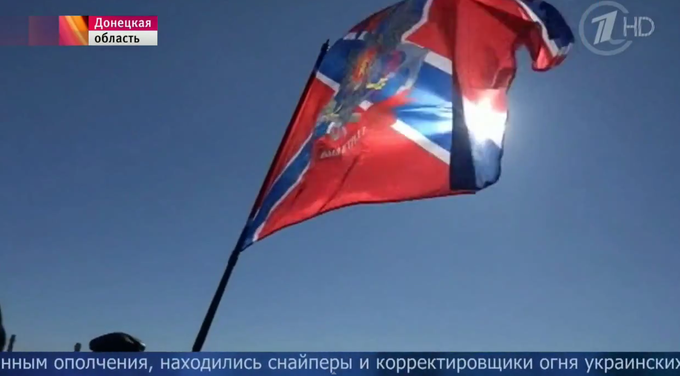The
Ukrainian forces, after their rout, have announced “an orderly
retreat” from Debaltsevo – they have “achieved all their
plans”.
Even
the BBC and the Guardian had to acknowledge that soldiers were coming
out on foot in a sorry state.
On
the other hand, RT reported Poroshenko’s words without irony.
The
western media is now having to report a crushing defeat in a
battlezone that a few short weeks ago they didn’t even recognise
existed, and wasn’t included into the Minsk talks.
Here
is the RT report followed by some reactions from mainstream western
media as well as by the Junta’s propaganda channel, Ukraine Today.
More on this later.
Kiev says troops withdrawn from Debaltsevo, rebels claim military ‘surrender en masse’
Kiev
troops surrounded in the city of Debalstevo have started to surrender
en masse, Ukrainian rebels have said. President Poroshenko announced
a complete withdrawal from the contested city.
RT,
18
February, 2015
Ukrainian
President Petro Poroshenko confirmed in a video statement that he has
given an order to withdraw troops from Debaltsevo on Wednesdsay.
“We
stated and proved that Debaltsevo was under our control and that
there was no encirclement. Our units withdrew according to plan in an
organized manner. They took military hardware with them – tanks,
APCs, artillery pieces, tow-tracks, cars,” the president said.
He
added that some 80 percent of the troops have already left the city.
Reuters
cited a witness who saw the troops, some of them injured, arriving in
Artemyevsk, a city northwest of Debaltsevo, through which a road
leading to Kiev-controlled areas goes.
Poroshenko
will visit eastern Ukraine later in the day and chair a security
council session in the evening, Ukrainian media reported.
Earlier
Semen Semenchenko, MP and commander of one of Kiev’s volunteer
battalions, reported that the troops were being withdrawn from the
contested city. He added that Kiev should now attack in other parts
of the frontline, which had been weakened by the rebels to lay siege
on Debaltsevo.
“They
are empty and we have troops. One strike and the frontline would
crumble,” he assured, adding that withdrawal is “beyond
comprehension.”
However,
DPR spokesman Denis Pushilin has denied Poroshenko’s statement,
saying Kiev troops are not being evacuated, but are giving themselves
up.
“Most
of these formations, which Poroshenko referred to, were defeated by
the militia forces, and some of these units surrendered or are
surrendering now,” Pushilin said as cited by the Donetsk news
agency.
Maksim
Leshchenko, a senior official in the self-proclaimed Donetsk People’s
Republic, also told journalists on Wednesday that the Ukrainian
troops are laying down their arms “in their hundreds.”
Earlier
on Tuesday, Eduard Basurin, a military spokesperson for the rebels,
confirmed taking some 300 soldiers prisoner.
Debaltsevo
was Kiev’s stronghold deep inside the rebel-held territories in
eastern Ukraine, a military asset portrayed in the media as a site of
a heroic last stand of the Ukrainian military. The rebels said they
had some 3,000 troops encircled in a pocket and had been calling on
them for days to lay down their arms and surrender. Kiev rejected the
claims, insisting that Debalstevo supply lines were intact and that
the city would remain under their control.
The
fate of Debaltsevo was arguably the biggest debating point at last
week’s peace talks in Minsk, which resulted in a ceasefire
agreement. The continued violence around the city contrasts the
virtually uninterrupted truce in other parts of eastern Ukraine.
On
Wednesday, anti-government forces started pulling back heavy weapons
from the frontline in quiet areas of the conflict zone.
“Five
152mm self-propelled artillery pieces are being withdrawn from the
village of Yelenovka to their permanent base,” Basurin told the
media.
Under
the Minsk agreement, Donetsk has 14 days to withdraw heavy weapons
completely, but if everything goes “as planned, we can handle it
faster,” the Donetsk Defense Ministry said.
“We
intend to start artillery withdrawal in those areas, where the
ceasefire is observed,” Basurin said.
On
the line of contact, where there is no military actions, weapons will
be pulled back “within 3-4 days,” the ministry stressed.
RIA
Novosti confirmed the pullout, saying that its correspondent
witnessed withdrawal of Grad multiple rocket launchers and tanks from
the disengagement line.
According
to Basurin, Debaltsevo is currently fully controlled by
anti-government troops, but there are groups of Kiev soldiers in the
south of the city trying to resist.
“DNR
troops are now conducting a search operation in Debaltsevo aimed at
locating and blocking those groups,” Basurin said.
He
also stressed the situation in the so-called 'Debaltsevo cauldron'
should not become a pretext for either Kiev, or militia to violate
the Minsk agreements..
The
OSCE confirmed the pullback of heavy weaponry from the line of
contact by Lugansk self-defense forces, the Russian representative to
the organization, Andrey Kelin told TASS.
"The
OSCE is receiving reports on an ongoing pullback of armaments by the
Lugansk republic," he said, adding that the organization doesn’t
have information on Donetsk weaponry withdrawal at the moment.
"The
OSCE doesn't have reports on it right now, although they've placed
about 20 patrol teams along the line of contact and these patrols are
expected to send in reports," he said.
EU
Foreign Policy Chief Federica Mogherini demanded an end to
hostilities around Debaltsevo and threatened Russia with more EU
sanctions.
"The
EU stands ready to take appropriate action in case the fighting and
other negative developments in violation of the Minsk agreements
continue," she said.
The
ceasefire also dominated Wednesday’s phone conversation between
Russian Foreign Minister Sergey Lavrov and US Secretary of State John
Kerry.
"Minister
[Lavrov] pointed out the importance of direct dialogue between Kiev,
Donetsk and Lugansk, including a speedy end to armed clashes in the
area of Debaltsevo, and reiterated the obligations of the Ukrainian
authorities to (conduct) constitutional reform and provide Donbass
with a special status," the Russian Foreign Ministry said in a
statement.
The
US State Department believes both sides in the Ukraine conflict need
more time to implement the Minsk peace plan, spokesperson Jen Psaki
said on Wednesday. US authorities haven’t taken a decision on arms
supplies to Ukraine yet, she added.
On
Tuesday, Russian President Vladimir Putin called on Kiev and the
rebels to do whatever they can to resolve the issue without loss of
life.
“I
really hope that the decision-makers in the Ukrainian leadership
won’t prevent the Ukrainian troops from laying down arms, if they
cannot take such an important decision themselves and order it. Or at
least they shouldn’t harass people who want to save their lives,”
he said.
“On
the other hand, I expect the militias not to detain those people and
allow them to leave the conflict zone and go back to their families,”
he added.
However,
there are some figures in Poroshenko’s government, who are “very
much pro-military,” political analyst and founder of Global
Political Insight Alexander Clackson told RT. Moreover, with the
Ukrainian population feeling that Kiev “is failing,” Poroshenko
can’t show weakness when it comes to eastern Ukraine.
“There
is an inner circle within Poroshenko’s government who are very much
pro-military if you like. They hate to see Ukraine being defeated
over and over again. We’ve seen it prior to the talks in September
in Minsk. And we have seen that again this time as well,"
Clackson said. "There is a general feeling among the Ukrainian
population that the Ukrainian government is failing in this conflict
in eastern Ukraine. So Poroshenko wasn’t able to come across as
weak during the last Minsk talks. Because if he came to these talks
saying ‘Listen, I’m ready to give up Debaltsevo,’ that would
cause a huge uproar in his own country, which is precisely why he had
to argue that Debaltsevo was not lost.”
Here is how the Guardian reported events, as well as an editorial
Retreat
from contested railway hub connecting Donetsk and Luhansk marks
strategic victory for rebels
The
best response to Russian policy in Ukraine is to play the economic
card
18
February, 2015
It
was obvious as soon as the Ukraine ceasefire was agreed last week
that both sides would fight hard in the time before it came into
force to either seize or deny territory, particularly in Debaltseve.
Such down-to-the-wire efforts are a feature of ceasefires everywhere,
and they often go beyond the wire, as they have at Debaltseve, where
the separatists have been able to squeeze the battered town so hard
in the last few days that Ukrainian forces are now withdrawing, in
what sort of order is not clear. Such land grabs are violations but
they may also demonstrate an expectation that the truce will last.
Why expend men and materiel to gain an advantage unless you expect to
be able to lock it in? So the Russians and the separatists probably
thought they could get away with it and then transform themselves
into supposedly dutiful observers of the agreement afterwards.
So
far that seems a correct calculation. In spite of protests and
late-night phone calls to Moscow, the line seems to be that the
ceasefire is damaged but not dead, in the words of Chancellor Angela
Merkel’s spokesman. President Petro Poroshenko, for his part, is
presenting Debaltseve as a something akin to Dunkirk, a heroic battle
against the odds and an orderly withdrawal under fire, but not as a
reason for entirely denouncing the ceasefire.
The
phrase “you can’t win” must often, and bitterly, come to mind
in Ukraine. The Russians can always up the ante when the Ukrainians
do well on the battlefield. The way the struggle for Debaltseve went
is only the latest reminder that the military situation in Ukraine is
asymmetrical, and almost entirely favours Russia and the separatists.
The economic confrontation, however, is also asymmetrical, and almost
entirely favours Ukraine and its friends in Europe and North America.
At the most local level, the rebel-held part of the Donbass region,
although slightly more coherent after the capture of the Debaltseve
rail junction, is not big enough or well-connected enough to be a
viable economic entity even if its run-down and now war-damaged
industries could be revived. Keeping Donbass on life support is not a
burden that Russia, staggering under the double impact of sanctions
and falling oil prices, wishes or is able to assume. It would prefer
that Ukraine and its western allies pick up most of that tab.
Potentially that hands some leverage to Kiev, particularly if Kiev
begins to prosper economically.
The
economic, social and political reform of Ukraine is indeed the top
card in the hand events have dealt Kiev and its allies. But, as
George Soros has said in a recent essay, that demands much more focus
by Europe, the United States and international institutions on
economic aid and fiscal assistance to the republic. Sanctions, he
argues, are a necessary evil because, while they keep up the
political pressure on Moscow, they damage both Russia and western
countries. The economic collapse of Russia, it should be noted, is in
no way desirable. The Russian default of 1998 was disastrous for
everybody. Greater help for Ukraine, on the other hand, would not
hurt Russia and would have only positive consequences for both the
Ukrainian and the European economies. Economic relations within and
with a prosperous western Ukraine might also help in time to soften
the antagonism between nationalists and separatists and make
President Vladimir Putin rethink his regional ambitions.
If
that is on the outer edge of optimism, and it is, it is still the
best way to go, making the most of Europe’s and America’s
economic advantages and pulling away from the dangers of military
escalation. That does not mean that some military preparations and a
more consistent signalling of Nato resolve are not appropriate, but
they are very much secondary. The fundamental aim must be to
transform the conflict into a contest in which force is at the far
end of the spectrum. Mr Putin could of course at any time revert to
the war option. The ceasefire, which Mrs Merkel rightly described as
offering only a glimmer of hope, could break down again, for example
in a push to take Mariupol. But Mariupol would be a city too far and
would lead to enhanced sanctions. So there is still a chance that the
ceasefire will lead not to peace – that would be too much to
suppose – but to a period when divergent objectives are pursued by
non-warlike means.
"An orderly and planned withdrawal" - This is how Ukraine Today covers the events.
This propaganda reel shows a truck without tyres and a truck deck soaked in blood.
The guy receiving the medal from Poroshenko doesn't have much to say, or even acknowledge him








No comments:
Post a Comment
Note: only a member of this blog may post a comment.